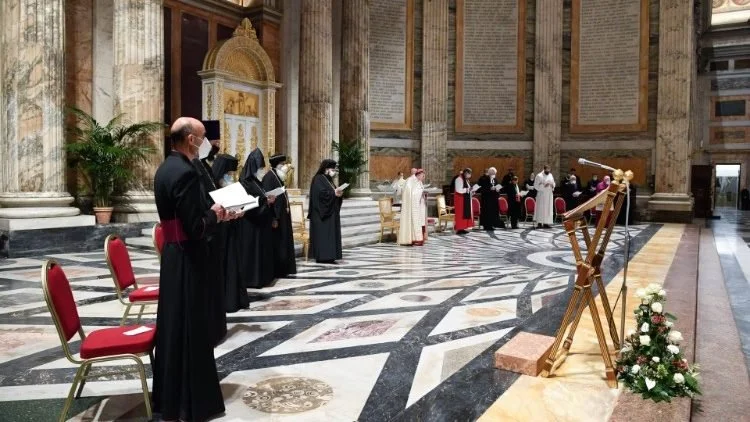Pandemic as an 'opportunity to help build ecumenical dialogue'
Celebration of Vespers at the conclusion of last year's Week of Prayer for Christian Unity (Vatican Media)
“Ecumenism in a Time of Pandemic: From Crisis to Opportunity” is the title of a working document presented by the Pontifical Council for Promoting Christian Unity, and which is the result of a survey conducted in 2021 among all the Bishops' Conferences and Eastern Catholic Synods in the world.
By Jean Charles Putzolu
In January 2021, 142 questionnaires were sent to those responsible for ecumenical relations in all the Bishops' Conferences and Synods of Eastern Catholic Churches.
The result of the survey is the basis of a fifty-page working document entitled “Ecumenism in a Time of Pandemic: From Crisis to Opportunity”, presented by the Pontifical Council for Promoting Christian Unity on Thursday, 20 January, at a panel organised at the Angelicum Institute for Ecumenical Studies, with the participation of students from the Bossey Ecumenical Institute.
All Churches in the same boat
The theme of the survey and the document (original text in English here) is based on an expression used by Pope Francis: "We are all in the same boat", which was taken up in many of the responses to the questionnaire. These words of the Bishop of Rome apply not only to the men and women of our time, but also to the different churches.
For Father Hyacinthe Destivelle, an official in the Eastern section of the Pontifical Council for Promoting Christian Unity, "this is the first ecumenical fruit of this pandemic, the awareness of being one Christian family and an awareness rooted in the experience of a common destiny. We are all on our way to a common destiny, which is the resurrection."
A new solidarity
During the two years of the pandemic, and especially during 2021, the year to which this extensive survey refers, a new bond, a new solidarity, was rediscovered. And while it has been a very complicated period for hundreds of millions of people, deprived of emotional ties and physical contact, and forced to adapt to limited movements, on more than one occasion confinements have been transformed into opportunities. The document gives numerous examples, whether in the field of spiritual ecumenism, common prayer, or online prayer.
Some bishops also noted that the Week of Prayer for Christian Unity was never so well attended as last year. "There were many joint initiatives, joint declarations, joint actions with governments, ecumenical programmes to help all the different groups of people affected in one way or another by the crisis," notes Father Destivelle, citing, among others, an ecumenical programme for the elderly and isolated people developed in India, or for students in Holland, two countries where Catholics are in the minority. All these initiatives came into being during the pandemic, and would probably never have seen the light of day had it not taken place.
The Christian churches are also aware that they have greater strength together. So they came together to present programmes in the field of charity, especially to help the poorest and most vulnerable. Christians were able to speak with one voice and had more clout with governments. They pleaded, lobbied and sometimes even pressured executives to respect religious freedom, which was not always considered a priority at the time of the lockdown.
Better mutual understanding
This solidarity, rediscovered and facilitated by the pandemic, has actually increased the number of opportunities for meetings and dialogue.
Church leaders have met, often online, as, for example, in the theological dialogues of the Pontifical Council for Promoting Christian Unity, often leading to a common line of thinking that has facilitated the drafting of joint documents.
At the local level, and this also emerges in the summary of the survey, people looked at each other much more. "Because many events were streamed on the Internet," notes Hyacinthe Destivelle, "Protestants were able to watch Catholic Masses, Catholics were able to watch Evangelical prayers, and so not only did this lead to better mutual understanding, but also to greater sensitivity.”
Differences remain
While the pandemic has promoted and facilitated ecumenical relations, full unity has not been achieved. The summary document highlights three of the most sensitive issues that emerged during the health emergency.
Theological and liturgical differences, which are not new, may have been accentuated by the pandemic, especially the understanding of sacred space. Orthodox, Catholics, and Protestants have different relationships with sacred space; different understanding of the sacraments and of the necessity of physical presence to receive the sacraments; and ultimately a somewhat different conception of the Church. However, these are not new controversies.
Different understanding from the pandemic
Perhaps more surprisingly, different Christian denominations may have different understandings of the pandemic.
"Some Christians have a more providential or sometimes more eschatological, or even sometimes apocalyptic view of the pandemic. This may have generated tensions among Christians," explains Father Destivelle…
This report was originally published on Vatican News website. Please click here to read the full text.

